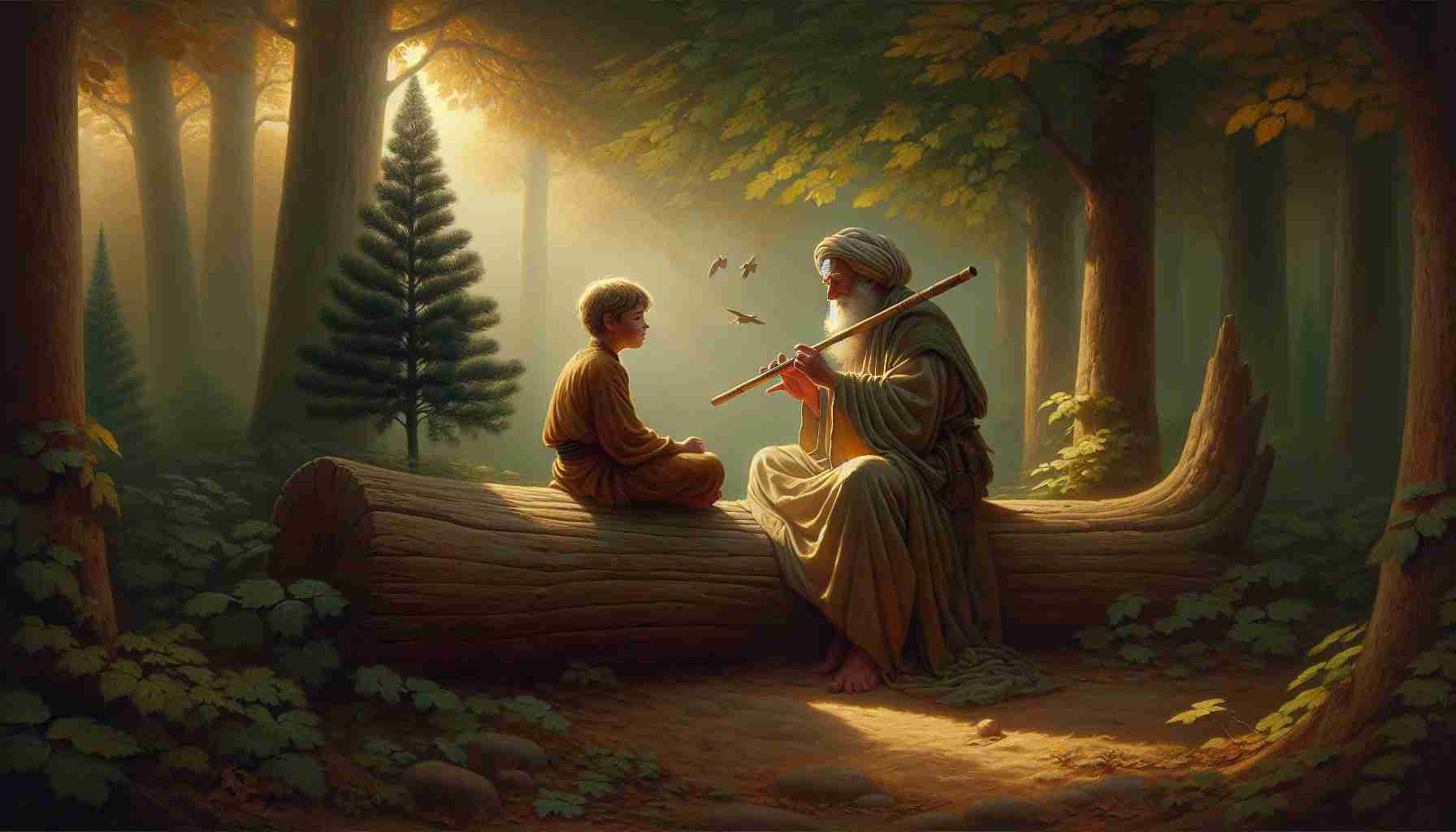

The forest was unusually quiet that morning. Even the birds seemed to wait. I was just 10 years old, sitting beside my grandfather in the little wooden hut we built years ago. He was a gentle man, quiet as the wind and old as the mountain behind us—though he’d chuckle and say the mountain had better stories.
He had been a musician once, before he became a monk. People said his songs could make flowers bloom faster or make even the grumpiest innkeeper smile. But after many years, he put down his flute and came to live in the forest, saying, “Some songs are better when never sung.”
I never really understood what that meant.
That morning, I was trying to write a song. My fingers strummed the strings of a broken lute we found during a walk. But the more I tried to make something perfect, the more it sounded... wrong. I huffed and tossed the lute aside.
“Why can’t I get it right, Grandfather?” I asked. “I try and try, but the song just won’t come.”
Grandfather brushed crumbs off his robe and sipped his tea, smiling gently. “Sometimes the harder you chase something, the farther it runs.”
“But how can I make a great song if I don’t try hard?” I frowned.
He didn’t answer right away. Instead, he pointed at a tree just outside the window.
“You see that pine tree?” he asked.
“Yes, of course.”
“It does nothing,” he said. “It doesn’t rush to grow or fight the wind. It just stands, and it becomes great.”
I sat quietly, looking at the tree swaying gently in the breeze.
Grandfather continued, “The Tao teaches us this—Wu Wei. It means... effortless action. Letting things be. Like the river that flows around the stone, not over it.”
I wanted to understand, but it still felt like I was doing nothing. So later that day, I went for a long walk in the woods, humming as I stepped over rocks and dirt. No lute. No paper. No plan.
Without meaning to, I began humming a tune. It came softly, like it was being born from the path itself. When I returned to the hut, Grandfather was waiting.
“Did you find your song?” he asked, eyes twinkling.
I smiled. “Yes... but I didn’t write it down. It just came and passed.”
He nodded, “That’s the song that was never sung. And it may be the truest one of all.”
I didn’t fully understand then, but that moment stayed with me. Sometimes I still hum that tune, but I never try to capture it.
Now I know—peace doesn't come from holding or forcing. Like the wind through the trees or the water in the stream, it flows best when we let go.
And just like that, the Tao began whispering its ways to me. Not through big lessons, but through the space between the sounds.
The forest was unusually quiet that morning. Even the birds seemed to wait. I was just 10 years old, sitting beside my grandfather in the little wooden hut we built years ago. He was a gentle man, quiet as the wind and old as the mountain behind us—though he’d chuckle and say the mountain had better stories.
He had been a musician once, before he became a monk. People said his songs could make flowers bloom faster or make even the grumpiest innkeeper smile. But after many years, he put down his flute and came to live in the forest, saying, “Some songs are better when never sung.”
I never really understood what that meant.
That morning, I was trying to write a song. My fingers strummed the strings of a broken lute we found during a walk. But the more I tried to make something perfect, the more it sounded... wrong. I huffed and tossed the lute aside.
“Why can’t I get it right, Grandfather?” I asked. “I try and try, but the song just won’t come.”
Grandfather brushed crumbs off his robe and sipped his tea, smiling gently. “Sometimes the harder you chase something, the farther it runs.”
“But how can I make a great song if I don’t try hard?” I frowned.
He didn’t answer right away. Instead, he pointed at a tree just outside the window.
“You see that pine tree?” he asked.
“Yes, of course.”
“It does nothing,” he said. “It doesn’t rush to grow or fight the wind. It just stands, and it becomes great.”
I sat quietly, looking at the tree swaying gently in the breeze.
Grandfather continued, “The Tao teaches us this—Wu Wei. It means... effortless action. Letting things be. Like the river that flows around the stone, not over it.”
I wanted to understand, but it still felt like I was doing nothing. So later that day, I went for a long walk in the woods, humming as I stepped over rocks and dirt. No lute. No paper. No plan.
Without meaning to, I began humming a tune. It came softly, like it was being born from the path itself. When I returned to the hut, Grandfather was waiting.
“Did you find your song?” he asked, eyes twinkling.
I smiled. “Yes... but I didn’t write it down. It just came and passed.”
He nodded, “That’s the song that was never sung. And it may be the truest one of all.”
I didn’t fully understand then, but that moment stayed with me. Sometimes I still hum that tune, but I never try to capture it.
Now I know—peace doesn't come from holding or forcing. Like the wind through the trees or the water in the stream, it flows best when we let go.
And just like that, the Tao began whispering its ways to me. Not through big lessons, but through the space between the sounds.